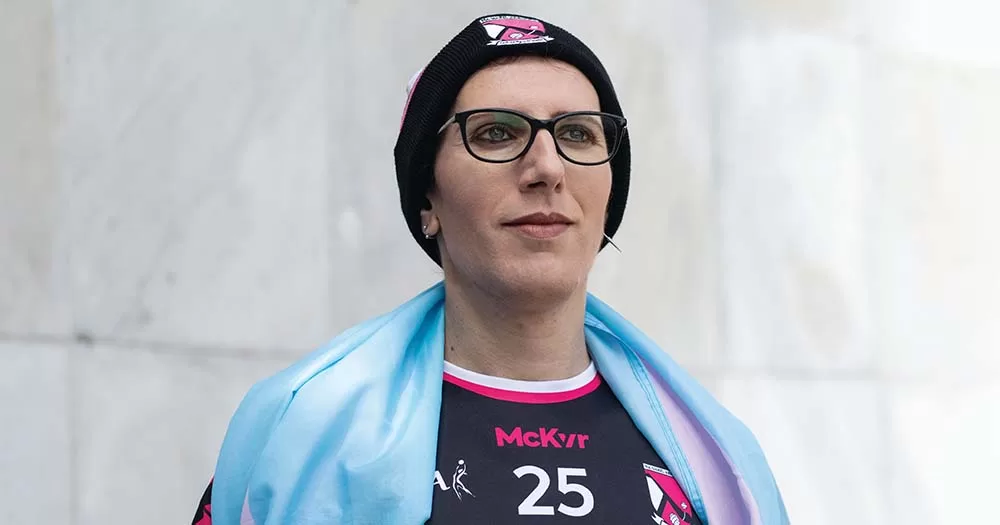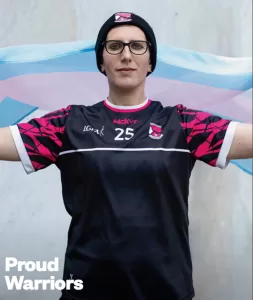As we celebrate Pride Month across this island, we must confront the harsh reality that our community faces a rising tide of disinformation, scapegoating and hate. It’s time again for us to channel our collective pain and anger into action for social justice. As part of the #StrongerTogether initiative in collaboration with the Rowan Trust and the Hope and Courage collective, GCN interviewed Giulia Valentino of the LGBTQ+-inclusive GAA club Na Gaeil Aeracha, who spoke about her experiences with the sport.
“When trans rights are under attack, stand up, fight back!” This is just one of the chants that has been projected loud and proud at recent protests and demonstrations countering the far right and anti-gender movements as they gain momentum in Ireland. Whether it be through physical, verbal, legislative or policy attacks, trans and non-binary folks have been increasingly targeted as of late. But, strong as ever, the community is standing up to the attempted oppression, demanding justice.
One such person who is challenging the hate-fueled action is Giulia Valentino, an Italian trans woman living in Dublin. Giulia plays GAA with the LGBTQ+-inclusive club Na Gaeil Aeracha, and while there have been many positives for her, there have also, unfortunately, been many difficult times.
Regarding why she wanted to get involved in the sport, she explained, “It’s something that gave me the opportunity to learn much more about this country, about the culture, to know more Irish people and become a bit more a part of this community.”
Although joining Na Gaeil Aeracha as a trans woman was a “very, very positive” experience, the challenges emerge outside of the club when Giulia is participating in a less safe and inclusive environment.
In 2022, Na Gaeil Aeracha reached the Dublin Junior J Ladies Shield football final, facing off against Na Fianna’s E team. It was a historic occasion for the club as they earned silverware for the first time ever, beating their local rivals by a score of 7-11 to 1-5.
However, the celebratory day was overshadowed, as certain members of the opposition and the match official took issue with Giulia’s presence on the pitch. After the match, the hurtful comments escalated on social media, with false claims and photos of her playing also being shared without her knowledge. As all of this took place, Giulia was never given the opportunity to take part in the discussion.
“Not being included in the conversation is a thing that trans people are quite used to. Having our privacy violated – same. Not feeling safe, feeling overexposed, is another thing that we are quite used to. None of it is nice.”
The effects of these events last long after the final whistle of the match blows, and Giulia Valentino admitted to being really impacted in the aftermath. “For a couple of weeks, I was literally afraid to leave my house, and I was tracing my way on the street. I was pinging people when I left or arrived to a place.
“I never go to matches on my own, I try to get a lift from some teammates. So yeah, I don’t feel particularly safe.”
For many, this would understandably be enough to deter them from sport, and while Giulia considered quitting, she was determined not to let her oppressors win.
“I want to play, I want to do sport in general…I want to keep playing with the team because I like this group, I feel I’m part of this group. I also got the role of Trans and Non-Binary Officer for the club. So I am trying to help out and continue the development of inclusion regarding trans people.”
Not only is Giulia Valentino working to improve participation within her own club, but as a result of her visibility, she has also influenced the LGFA to create its first-ever Trans Policy, under which she became the first approved applicant to play.
Although stating, “The policy itself is not perfect, there is huge room for improvement,” she added, “I was incredibly happy because this is a milestone. We made this in this country, in an environment that I was told is historically quite conservative.”
It is ultimately a step forward for trans inclusion, something Giulia can certainly be proud of. “Once I got the policy, my mission was kind of complete because I achieved the most I could achieve in my sport career – obtaining some rules to grant inclusion to the future generation…Now that I have rules on my side, I can play.” In a powerful message to other trans folk fighting for visibility and inclusion in the currently hostile climate, she emphasised: “If we are not given our space, we have to take it over. It may mean taking some risks sometimes, but if we are together, these risks can be shared, can be prevented.”
She concluded: “If there is a community demanding and taking space, the game is very different. We can achieve more, we can achieve it more quickly, and we can achieve it more safely…It may be scary, but we have do it.”
This story originally appeared in GCN’s Pride issue 378, as part of an ongoing feature on solidarity that was created in cooperation with the Rowan Trust and the Hope and Courage Collective. Read the full issue here.
Want to be featured in this special campaign? Share a message of solidarity using #StrongerTogether, tagging GCN or email [email protected].
© 2023 GCN (Gay Community News). All rights reserved.
This article was published in the print edition Issue No. 378 (June 1, 2023). Click here to read it now.
Support GCN
GCN is a free, vital resource for Ireland’s LGBTQ+ community since 1988.
GCN is a trading name of National LGBT Federation CLG, a registered charity - Charity Number: 20034580.
GCN relies on the generous support of the community and allies to sustain the crucial work that we do. Producing GCN is costly, and, in an industry which has been hugely impacted by rising costs, we need your support to help sustain and grow this vital resource.
Supporting GCN for as little as €1.99 per month will help us continue our work as Ireland’s free, independent LGBTQ+ media.

